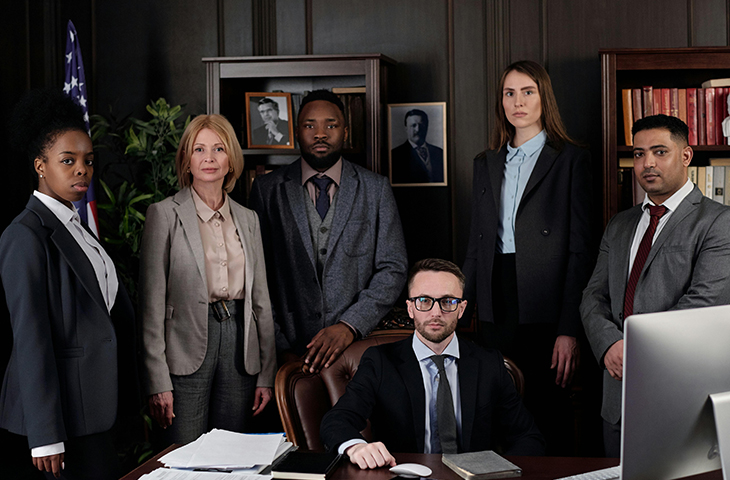Law Students Say They Want To Work For The Firms Standing Up To Trump

President Donald Trump’s attacks on major law firms have divided the legal community all the way down to its newest members: law students considering their futures.
As summer approaches, law firms are heating up their campus recruiting efforts among the nation’s first-year law students, looking to hire for future summer associate positions that can lead to full-time offers with starting salaries greater than $200,000 after graduation.
For many current law students, firms that have challenged Trump’s executive orders in court or publicly signaled their support of those lawsuits now seem more appealing destinations than those that have struck deals with the administration, according to students, recruiters and lawyers involved in firm recruitment efforts interviewed by POLITICO.
And it’s not just 1Ls reconsidering where they want to work this summer. Some third-year law students, weeks away from graduating, who have already secured offers from firms that capitulated to the president are reconsidering their options, two people involved in hiring and recruiting at major firms said.
“I’ve never seen that happen,” a partner at a firm challenging its executive order, granted anonymity to speak candidly about hiring, said.
Standing up for the legal profession and the rule of law has given certain firms a big boost in visibility with students, said Bryson Malcolm, a legal recruiter based in New York.
“Students aren’t really locked into every single law firm,” Malcolm said. “The firms who have lawyers who are actually proud to be there right now … I just think that’s going to come out when you’re talking to them and students might end up going for that.”
Since February, Trump has repeatedly used executive orders to punish law firms that have represented his political opponents, sued his allies or employed his critics. Thus far, three firms — Perkins Coie, WilmerHale and Jenner & Block — have challenged those orders in court and obtained judicial rulings blocking provisions that cut them off from government contracts and severely restricted their ability to represent clients who do business with the government.
Other targeted firms have elected to make deals with the president to avoid such economic threats. Under the terms of those deals, firms have agreed to commit up to $100 million in pro-bono work toward the administration’s preferred causes and cease use of diversity, equity and inclusion practices.
Students are paying close attention to how firms respond, including tracking law firm actions in a spreadsheet shared widely online.
“At a time where our judiciary and legal system as we know it are under attack, I think it’s more important than ever for these giants to use their voices and stand up to the bullies and preserve the integrity of our profession,” said one Georgetown Law student granted anonymity because they feared professional retaliation. “When people are under pressure their true selves emerge and we’ve certainly seen where the different priorities lie.”
Paul, Weiss was the first major firm to make such a deal in March, followed by Skadden Arps, Willkie Farr and Milbank. None of those firms immediately responded to a request for comment. Other firms are reportedly in negotiations with the administration.
“We’re going to be close to a billion soon,” Trump aide Stephen Miller said of the pro-bono commitments Wednesday as the president signed a new executive order targeting firm Susman Godfrey. Susman has pledged to challenge the order in court.
Beyond the three Big Law firms that are fighting for themselves in court, law students are also looking favorably upon those that have come out in support of those firms. More than 500 firms signed an amicus brief filed in the Perkins Coie lawsuit expressing their support for their fellow legal professionals and the rule of law. But the brief lacked signatures from some of the biggest names in the industry. Only 11 firms in the Vault 100, the most prestigious law firms in the country as ranked by their peers, signed the brief. Of those 11, only Covington & Burling ranked in the top 20.
“When I’m talking to these law students and they’re asking what Covington thinks about this stuff, I can honestly and vociferously say we do not stand with the position that Paul, Weiss took or that any other firms that capitulated took,” said an associate at Covington granted anonymity to speak candidly about recruiting efforts.
Two Georgetown Law students, who requested anonymity because they feared professional retaliation, said they adjusted their lists of preferred firms to prioritize those standing up to the administration’s orders.
When deciding what firms to meet with during next month’s on-campus interviews, one of those students included Covington twice in her top five, spending valuable interview slots on both the firm’s New York and Washington offices.
“It became more important to me to be at a firm that was doing the right thing even if that meant not necessarily being in precisely the location that I had initially wanted,” she said.
“I want to be in a workplace where there is a diversity of experiences, of backgrounds, of cultures and that all those people would be supported in their work,” she said. “Not to mention that we are lawyers and if you are not standing up for the rule of law then I’m not really sure what we’re doing.”
Firms that have taken public stances against the administration’s efforts seem to be finding it easier to have frank discussions with law school recruits. During a recent Georgetown Law affinity group recruiting event, representatives from various firms that have remained silent struggled to clearly articulate their employers’ position on the executive orders, “ignoring the elephant in the room,” one student who attended said.
A conversation with an associate at Perkins Coie earlier this week posed no such problems, the student said.
“Hearing the staff is united on this stuff and just hearing that unity and that commitment to preserving the values of the legal profession,” she said, “it’s what I came to school for and it’s just great to hear.”


